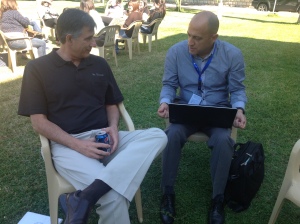
Choice is a big deal in Scripture, although the writers of the Bible at times seemed to be expressing quite a different view. Choice is a big deal in the Bible because choice is a huge deal to God! To create human beings with an incredible system of internal control and then place them on a planet marked by free will is a clear demonstration of God’s character and an important indication of the way the universe operates. In spite of these clear markers of God’s way of being, Bible writers sometimes characterized God as pouty, arbitrary, and angry.
For instance, when we see wording like – “The Lord will stay with you as long as you stay with Him!” and then “But if you abandon Him, He will abandon you.” (2 Chron. 15:2) – it is tempting to see God as a simple IF/THEN God. If we love Him, then He will love us, which is a classic way of describing a very conditional love, a love with manipulative strings attached. Several writers in the Bible echoed this kind of wording. “If you return to Me, I will restore you,” Jeremiah proclaimed (15:19), and “Return to Me and I will return to you,” Zachariah wrote (1:3), and Malachi added “Now return to Me and I will return to you” (3:7). Maybe you are getting the picture. When we read passages like these it is easy to see God as controlling and manipulative.

This brings up questions like – How accurate is the Bible?, and What is the nature of inspiration? I am pretty sure that God is fine with us reflecting on these kinds of questions, but the thing is, do we really get the predicament we are in? I think, for instance, that it is hard for us to grasp the size of the chasm that sin created between heaven and earth. Where once Adam and Eve enjoyed face to face communion with their Maker, now we “see things imperfectly, like puzzling reflections in a mirror” (1 Cor. 13:12). In spite of this chasm, God set about restoring mankind and the planet. Some people were inspired to write their thoughts and impressions and, in quite a few cases, their visions. I don’t think we can be sure of the extent to which the writers’ backgrounds and personal views affected their writing. Nor can we fully understand the extent to which the context of their cultural circumstances affected their writing. We do know, though, that over a period of 1,500 years, 40 different writers picked up the pen or quill or stylus and tried to share what God had given them.
I think it is safe to say that all of the Bible writers were to some extent affected by their culture, and often their phrasing captured more of that culture than they may have realized, including the texts shared earlier that seemed to reveal an arbitrary, and even capricious god. Since the beginning of mankind, cultures have placed a high importance on worship and appeasing the gods, even going as far as offering human sacrifices to please their god or to ward off his displeasure. To what extent then did the writers of the past fully understand the character of God?

A text in Isaiah sheds light on this topic. Indeed, it is like a key to me that opens my understanding of the “controlling-sounding” texts with which I have struggled. Isaiah worded it like this – “So the Lord must wait for you to come to Him, so He can show you His love and compassion” (30:18). Think about this wording – the Lord must wait for us to come to Him. Again – the Lord must wait for us to come to Him. What pictures arise as you think about this wording? What feelings wash over you as you picture God yearning for you to seek Him? Another text comes to mind, a text in which John described Jesus standing at our front door and knocking, all the while hoping that we will answer the door and invite Him in to share a meal together (Rev. 3:20). Now, instead of seeing God as wanting to control my affections, I realize He is respecting my power of choice. It has always been about choice, and it always will be.
The chasm that sin and selfishness have created
between heaven and earth is great,
but God has spanned the chasm and provided a way
for us to commune with Him and enjoy Him.
God the Father, Son, and Spirit have teamed to span the distance
and bring us into intimate contact with each of them.
My personal view is that our little, speck of a planet is the focal point of a cosmic conflict in which the character of God has been on trial. As citizens of this planet, we must choose the side of the conflict to which we will be loyal, the side of the conflict that we think offers the universe the best future, an eternal, sustainable future. Conflicts often have rules of engagement, guidelines that set rules and boundaries of behavior. I think God set up rules of engagement for the conflict as it played out on earth. The adversary, satan, could not impose his will on humans, unless they put themselves on his ground or gave him a handhold into their lives, and on the flip side, neither could God. Humans were not to become victims of powerful, supernatural forces, instead God would put into place rules of engagement that uplifted and endorsed the power of choice. Humans must be free to choose.
Hence, Isaiah got it right when he wrote –
So the Lord must wait for you to come to Him
Isaiah 30:18
– so he can show you His love and compassion.
For the Lord is a faithful God.
– Blessed are those who wait for His help.
It isn’t that the other Bible writers got it wrong. Technically, what they wrote is accurate – God will restore us if we come to Him. Isaiah’s wording, though, reminds us that God isn’t about controlling and manipulation. Rather, He aches for us to come to Him. He yearns to connect with us, to fill us, to heal us, and to restore us to our original peace and joy.












